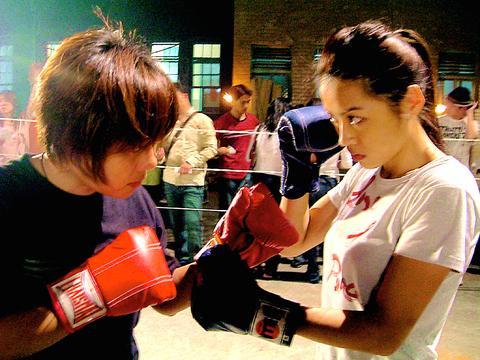There are two choices of Chinese-language films this week: An animated film from Hong Kong about a piglet's life that mocks elitism and new policies in Hong Kong; and a Taiwanese modern drama replaying the classic theme ofButterfly Lovers.
After world-wide accolades last year -- including the Best Animated Picture title at the Golden Horse Awards -- the crew of My Life as McDull (

PHOTO COURTESY OF PANDASIA FILMS
For those unfamiliar with McDull, he is a piglet studying in the Spring Field Flower Flower kindergarten (
She tries her best to give her son a happy childhood and expects a lot in return, in terms of his future success. McDull, however, is a carefree child without much ambition. He hopes to fulfill his mom's wishes, but usually fails.
In this sequel, the pictures are still water-color based, with realistic drawings of Hong Kong's streets, characterized by signboards for hemorrhoid clinics and traditional drug stores.
Times are still hard for the McDull family. Their neighborhood houses are being torn down by the Urban Renewal robot. Ms. McDull, voiced by comedienne Sandra Ng, is anxious about the future and she buys insurance, US dollars and lots of toilet paper. She also purchases a plot for a grave in the mountains that has good feng-shui.
As in the original film, McDull and his classmates are obsessed with becoming Hong Kong's national sports icons and going to the Olympics. In addition, they are required to learn Mandarin in order to integrate more with China. They are encouraged to practice "fake-death" skills, creative urinating and fishing for squid in the mud. The principal of the school believes these are essential skills to survive in a changing Hong Kong.
McDull, who is proud of his cross-legged leg-shaking, also gets to perform in public with Jo Jo Ma (a pastiche of Yo Yo Ma, presumably), to the accompaniment of Bach's cello suite, his crossed legs beating a rhythm to the music.
The film also discloses the story of McDull's absent dad, who is actually Prince de la Bun, the Pineapple Bun Prince and owner of a popular tea restaurant.

May 18 to May 24 Pastor Yang Hsu’s (楊煦) congregation was shocked upon seeing the land he chose to build his orphanage. It was surrounded by mountains on three sides, and the only way to access it was to cross a river by foot. The soil was poor due to runoff, and large rocks strewn across the plot prevented much from growing. In addition, there was no running water or electricity. But it was all Yang could afford. He and his Indigenous Atayal wife Lin Feng-ying (林鳳英) had already been caring for 24 orphans in their home, and they were in

On May 2, Chinese Nationalist Party (KMT) Chairman Eric Chu (朱立倫), at a meeting in support of Taipei city councilors at party headquarters, compared President William Lai (賴清德) to Hitler. Chu claimed that unlike any other democracy worldwide in history, no other leader was rooting out opposing parties like Lai and the Democratic Progressive Party (DPP). That his statements are wildly inaccurate was not the point. It was a rallying cry, not a history lesson. This was intentional to provoke the international diplomatic community into a response, which was promptly provided. Both the German and Israeli offices issued statements on Facebook

Even by the standards of Ukraine’s International Legion, which comprises volunteers from over 55 countries, Han has an unusual backstory. Born in Taichung, he grew up in Costa Rica — then one of Taiwan’s diplomatic allies — where a relative worked for the embassy. After attending an American international high school in San Jose, Costa Rica’s capital, Han — who prefers to use only his given name for OPSEC (operations security) reasons — moved to the US in his teens. He attended Penn State University before returning to Taiwan to work in the semiconductor industry in Kaohsiung, where he

Australia’s ABC last week published a piece on the recall campaign. The article emphasized the divisions in Taiwanese society and blamed the recall for worsening them. It quotes a supporter of the Taiwan People’s Party (TPP) as saying “I’m 43 years old, born and raised here, and I’ve never seen the country this divided in my entire life.” Apparently, as an adult, she slept through the post-election violence in 2000 and 2004 by the Chinese Nationalist Party (KMT), the veiled coup threats by the military when Chen Shui-bian (陳水扁) became president, the 2006 Red Shirt protests against him ginned up by